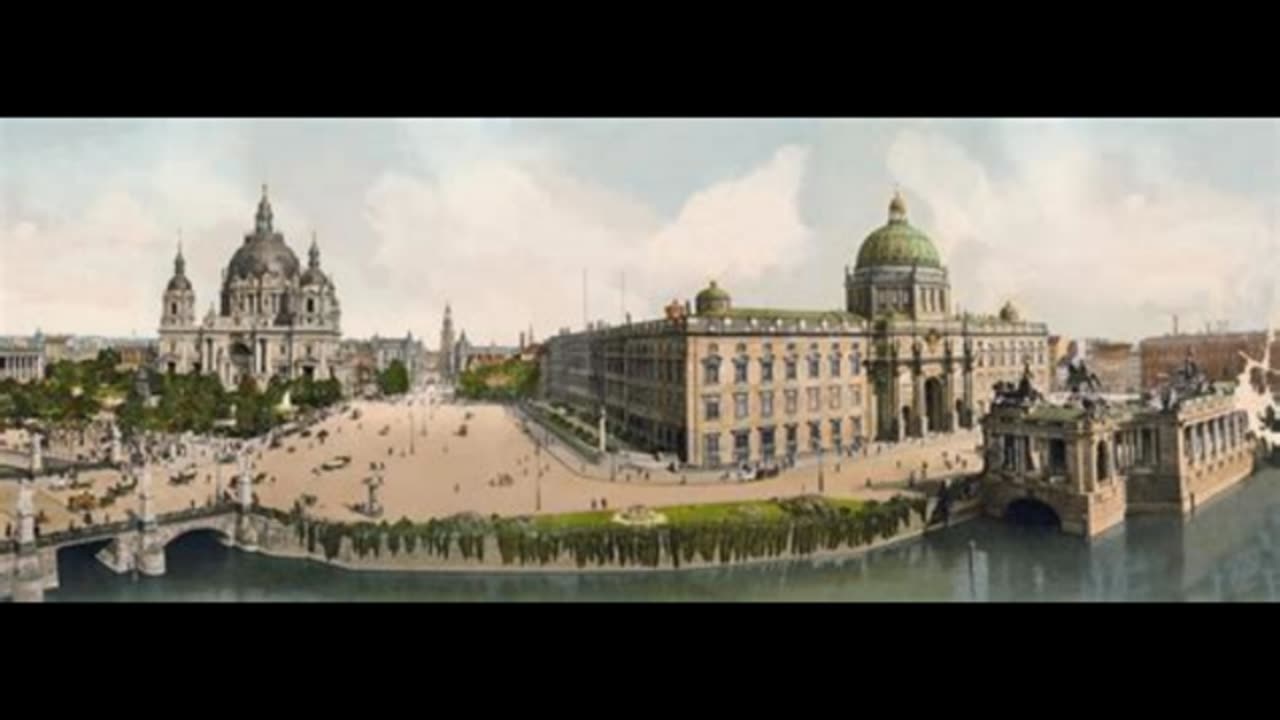Premium Only Content

The Kulturkampf. An essay by Gordon Boyce Thompson. 1909.
The Kulturkampf.
The conflict was between a system of belief and the temporal political power of the state.
A system that sought to regulate the temporal affairs of men, as an arbitrary power. Against this was a conventionally organized state.
What are the differences?
The Catholic Church was external to Germany. It was organizational and it was bureaucratic.
The “Church of Wokeness” is an internal meme. It has no central authority, manifesto or main political actors. Unlike communism, there are no unassailable champions. Every one of its proponents is replaceable. Although wokeness seeks to corrupt everything it touches, it does not present a stable political doctrine. Whereas socialism had the bible of Marx, wokeness presents a handful of sand.
Unless wokeness generates a consistent political theory, it will dissolve. Although the democratic party my bend to it, it is unlikely that it will be completely absorbed by wokeness.
The Kulturkampf.
An essay by Gordon Boyce Thompson.
1909.
One of Bismarck's earliest biographers, the German Gorlach, was perhaps the first of his contemporaries to remark that the surest sign of the Chancellor's genius is the fact that one is obliged to go back several centuries to understand the connection of his actions. Whether this be a proof of a man's historical importance or not is a question concerning which much might be said; at all events everyone will admit that Gorlach was right in claiming it as one of the characteristics of Bismarck's work.
For to understand that work in its broadest and deepest significance one must go back almost to the days of which the Germania treats, and must study all those elements, forces and antagonisms which have from time to time characterized the story of the German people, and which the man of blood and iron aroused, but also brought to their final crisis. He seemed to have a genius for reviving and revising history; for writing, as it were, the last, or at any rate another chapter of the old, old stories of the middle Ages. He made possible the realization of the German dream of unity, brought to maturity the fruits of the wars of liberation, re-established the imperial throne, and lastly, and this is of more importance to us in the present connection, he revived the ancient struggle which had filled the pages of history throughout the Middle Ages, the struggle between priest and king, between Pope and Emperor.
It was indeed a far cry from Konradin of Hohenstaufen, that last representative of the Swabian dynasty who died beneath the Papal axe wielded by French conquerors, to Wilhelm of Hohenzollern, whom Pius the ninth hoped to humble by the gestis Dei per Francos, to many it might seem that the gulf between the two was not to be bridged over. Yet notwithstanding all the changes which the lapse of time had brought forth, under Bismarck the struggle between Guelph and Ghibelline was revived, and a new chapter added to the story which for seven centuries had lain untouched. The war which the newly founded empire waged with Rome was precisely the same struggle which in 1254 had ended with the virtual destruction of the Empire. It was of course translated into the customs of our own day, and therefore lacks much of the picturesqueness of the earlier campaign.
The battles were fought no longer with swords but with words, and the journeys to Canossa performed not amid Italian snows but in modern, northern Berlin; yet this fresh struggle is in many respects as interesting and instructive as the earlier one. Like its predecessor, it is in the main the chronicle of Roman triumph and German defeat, a study of the limitations of the genius of one of the greatest, of moderns; yet even though its lessons are negative, they are none the less valuable for the statesman who to-day finds himself brought into fresh conflict with Rome through the recent encyclical against Modernism.
At a time when Church and State, or at least the forces of Roman re-action and secular progress have come again into conflict in half the countries of Europe, a study of the Kulturkampf," the so-called culture war," which was fought out thirty years ago in Prussia, cannot but be both valuable and timely.
One.
In considering the causes of the Kulturkampf "one is quickly led into the field of international politics. The fate of the temporal power of the Pope was in reality sealed in October, 1861, when Cavour announced in the Sardinian Chamber that the King and he looked forward to the day when Rome should be proclaimed as the “glorious capital of the Kingdom of Italy," and Pius himself undoubtedly realized at the beginning of the sixties that unless heroic measures were taken in Rome the sovereignty of the Papal States would sooner or later be usurped by the newly proclaimed Kingdom. The events of the next few years, moreover, were so unfavourable to the interests of the Vatican in Europe as only to confirm the Pontiff's fears.
The Italian capital was moved from Turin to Florence; on the field of Koniggratz, Catholic leadership in the Gemian Federation was forever doomed; and owing to adverse public opinion in France and to Napoleon's personal relation with the Italian movement, the Empress Eugenie was every year less and less able to champion the temporal interests of the Pope. But on the other hand, after 1866, as war between France and Prussia became more and more probable, the politicians of the Vatican, to whom the possibility of a French defeat was unthinkable, began to regard such a struggle as the cure-all for the manifold diseases from which the Ultramontane cause in Europe was languishing. A French victory would undo all the mischief of the last ten years, evangelical Prussia would again be reduced to the rank of a second-rate power, and the Third Empire would be so strengthened by the victory that Napoleon would be able, perhaps, in conjunction with Austria, Prussia's ally of 1864, in this way to save the temporal power of the Pope.
It would not do, however, to leave the whole work of defence to French bayonets, and accordingly on June twenty ninth, 1868, invitations to an Ecumenical Council were issued to meet in December, 1869. The real purpose for which the Council was summoned, namely, a declaration of Papal Infallibility, was not stated in the Bull which called the Bishops together, but nevertheless the Jesuit plans were known early in 1869 every capital of Europe through a hint which was given in February, doubtless intentionally, by the editor of the "Civilita Cattolica," a semi-official Jesuit paper published in Italy.
A declaration of Infallibility was looked forward to with anxiety by almost every government in Europe. Especially was this the case in Bavaria, where the Minister- President, von Hohenlohe, in April, 1868, went so far as to issue a letter to all the European governments pointing out the dangers which would accrue from any further extension of the Papal claims. During the session of the "Zollparlament" in this year Hohenlohe and Bismarck often discussed the matter, and always in perfect agreement," and the Bavarian minister knew in this way with what dread and growing anxiety" the Chancellor viewed the step which the Vatican was contemplating.
One does not wonder at Bismarck's anxiety, for the new dogma, while aimed perhaps primarily against Italy, would also be meant for a very direct attack on the German Confederation as the Revanche fur Sadowa," as the requital for the crimes which the Protestant state had committed since 1866 in working for the unity of Germany on evangelical lines and encouraging that of Italy in its efforts to capture Venice and Rome.
The Chancellor was moreover aware that there was a party in the Vatican possessed with the fixed determination of disturbing the religious and political peace of Europe, in the fanatical conviction that the universal distress produced by such disturbances would add weight to the Church." Nevertheless he resolved to await developments and, so long as the operations were carried on purely in the theological field, to remain passive. "Our operations can only be commenced when we see danger of political encroachments," he wrote in January, 1870. For Prussia there is constitutionally and politically only one standpoint, namely, perfect freedom for the Church in religious matters, and determined resistance to every encroachment on political territory.
Our waiting policy becomes all the easier, he continued, because, whatever may be the final result, we especially have no cause to fear any political dangers, since we are certain to find on the field of legislation the means for overcoming every crisis and reducing the claims of our opponents to a level conformable with our political life.
The Council met on December eighth, 1869, and as soon as it became clear that a desperate effort would be made by the Jesuit party to pass the new dogma, thousands of voices were raised in opposition all over Europe, and after the French and Austrian governments had sent in protests to the Holy See and the German Bishops had added their voices to the general cry of disapproval, Bismarck himself went so far as to instruct the North German ambassador at the Holy See to inform the Papal Secretary that the fear had been expressed in Germany that the doctrine which Rome was threatening to proclaim might throw the relations of Church and State into confusion."
"We have no interest in weakening the authority of the Pope," Arnim reported to Antonelli, but in Germany Catholic and Protestant must live together in peace." Further than this Bismarck did not feel able to go, and although the Pope's irresolution was doubtless in no small measure to be ascribed to the opposition manifest in Germany, such measures were in reality lost on the Vatican. On the eighteenth of July, 1870, the Papal Infallibility was declared, on the nineteenth war broke out between France and Germany. Even so fanatical a Protestant as Blum admits that no one would assert that France had anything to do with the Dogma;" nevertheless the two declarations had this much in common that they were both aimed against Prussia.
In after years it seemed to Bismarck that the Empress Eugenie's partiality for the warlike tendency in French politics could hardly have been unconnected with her devotion to the Catholic Church and the Pope," and that in case of victory the Empress would have shown her devotion to the Pope in Germany" and so have provided a fiche de consolation, even if an inadequate one, for the injuries which the
Papal See had sustained in Italy with, and by means of, Napoleon's concurrence, once let the French armies reach Berlin and the interests of the Catholic Church in Prussia would be safe for many years to come.
Such were the hopes of the Curia, but never were hopes destined to bitterer disappointment. Sedan fell; Eugenie fled to Protestant England; the Paris mob, with the roar of German cannon in its ears, emancipated itself from the leadership of the Jesuits and proclaimed a republic; and on September twentieth, as the German artillery bombarded Paris, the Italian troops entered Rome, and the Temporal Power was proclaimed to be at an end.
Pius was alone in Europe, the enemy within his gates and he himself without an ally. Prussia had been responsible for it all, the fight at Sedan had opened the way to Rome to the Italian armies; yet for the present it was quite manifest that revenge was not to be thought of; that could wait, for the Infallibility Dogma was a weapon which would not grow rusty. On the other hand, the crying necessity of the moment was to provide a place of refuge for the Holy Father in case the Vatican itself should be attacked and he forced to fly from Rome. France and Italy were closed to him, Austria was insecure, and the Pope's advisers found themselves face to face with the astounding fact that it was only within German borders that a suitable asylum could be found.
Accordingly, early in October, the Pope approached Graf von Arnim, the ambassador of the North German Federation at the Holy See, on the subject of his finding a place of refuge in Germany, and on the seventh Bismarck received a telegram at Versailles from Arnim asking whether the Pope in case he wished to leave Rome could rely on the protection of His Majesty the King of Prussia." The Chancellor replied next day in the affirmative, and is reported as having said in regard to the matter. We have been asked whether we could afford the Pope an asylum.
I have nothing to say against the scheme: Schloss Bruhl at Cologne or Fulda are open to him. It would be an unheard-of turn of events, but a very useful one for us, if we could appear to the Catholics as the only power of the present day, as indeed we are, that could and would afford protection to the highest prince of their church."
There was moreover in parts of Germany itself a strong feeling that one of the first acts of the new Empire should be intervention on behalf of the territorial interests of the Pope, and early in November Count Ledochowski, the Archbishop of Posen and Gnesen went to Versailles to interview Bismarck on the subject. The Chancellor, who at this time was afraid that the interference of the neutral powers might spoil the results of the Prussian victories, suggested that Germany might support the Pope, provided that Papal influence should be brought on the French clergy in the interests of peace.
Ledochowski tried to move several members of the higher clergy in the direction indicated, but could only report that his advances had been coldly met and declined ; and from this Bismarck concluded, to quote his own words, that the Papacy must either lack the will or the power to afford him any assistance in obtaining peace of a sufficient value to make up for the displeasure which would be felt by German Protestants and Italian Nationalists should the Empire openly champion the Papal interests in regard to Rome." In other words, as soon as Bismarck saw that Germany could gain nothing in France or elsewhere by supporting the temporal power, he resolved, notwithstanding the assurances which had been conveyed through Amim to the Holy Father, to take no part whatever in the Roman question.
A few days after Ledochowski's return to Germany the elections to the Prussian Abgeordnetenhaus took place. During the campaign in many of the ridings candidates of the most varied political opinions had come forward and pledged themselves to protect the Church should it be attacked in the general re-organization of Germany, and to support a movement for the restoration of the Pope.
In the preceding August the Prussian bishops, despite their protests of an earlier date, had finally accepted the Infallibility Dogma in their official capacity, and in the election campaign great numbers of the Prussian priesthood worked on behalf of the candidates who had declared themselves in favour of the Ultramontane propaganda. The cause was naturally a popular one in many neighbourhoods, and no less than sixty Catholics found themselves elected as members.
At the time of the elections there was no intention of building up an Ultramontane" fraction" in the House, although the idea of a Catholic party was by no means new. In 1852 owing to certain anti-Jesuit decrees, the so-called Katholische Fraktion " was founded, and gained sixty-one seats in the election of that year. For ten years the party had continued to send a similar number of deputies, but when Bismarck entered the ministry in 1862 the people became more and more interested in the constitutional conflict and church questions sank into less prominence, so that finally in 1867 the Catholic party ceased to exist in the Chamber. But in the autumn of 1870 the public mind was dwelling again on ecclesiastical problems; the effects of the French war and the Infallibility Dogma upon the position of the Catholic Church in Prussia could not be calculated definitely; the Pope moreover was in need of help, and altogether it was easy for office-seekers so to work upon a nervous electorate as to induce it to return a large number of Catholics irrespective of the party to which they belonged.
At the same time, it is well to repeat that in 1870 there was no intention of establishing a new fraction" or of reviving the old one, and to describe the Catholic members as constituting at this time a new party is doubly incorrect.
The leading Ultramontanes had declared against such tactics. On the other hand, what was intended was that in casethe position of the Church in Prussia should in any way be menaced owing to the unsettled conditions of the times, then and not before, these men and, it was hoped, also others, irrespective of creed or party, might band themselves temporarily together in the effort to promote the religious interests of the people. There was no party organization during the elections, nor for some time afterwards.
On December fourteenth the House came together.
The Ultramontanes, still without party organization, took the seats assigned to them in the centre of the chamber. For a complete month they continued so, and then suddenly, on January eleventh, 1871, they constituted themselves into the Constitutional Party" (Verfassungspartei) or Centrum."
The causes for this step are not difficult to discover by the beginning of the new year the failure of Ledochowski's expedition had become known, and it was generally supposed that Bismarck had decided to refuse to support the Pope. It was to win this support that the Catholic members had been elected; had it been freely given they would not at this time have constituted themselves into a party; but the support had been refused, and the time had therefore come for concerted action. There was in reality no change of front, no contradiction of the expressed convictions of the leading Catholic politicians in regard to the inadvisability of reviving the Catholic Party; for the Catholic Party had not been revived.
The two names which had been provided for the new fraction" were absolutely non-sectarian, and it was hoped and even expected that many Protestants who favored the restoration of the Pope, would join with the Centrum until the present crisis should be passed. It was felt that there was no time to be lost in beginning the campaign for German intervention in Italy, and on February eighteenth an address was sent to the Kaiser at Versailles, praying that" one of the first acts of the Imperial wisdom and justice" might be the restoration of the rights and freedom of the Holy Father." For the Papacy there could be no other independence than sovereignty itself.
The elections to the first Reichstag took place on March third. The fears of the Catholic South for the fate of their Church in the newly-founded Empire, and the natural desire that the Pope should be restored to power in Rome, caused the Ultramontanes to make a determined effort to gain representation in Parliament. In order to capture the votes of those people to whom the religious causes did not appeal, the candidates also pleaded against over-centralization in Berlin and the complete sinking of the nationality of the various states in that of a united Germany. In short, the Catholic and Individualistic policies were united, and thus it came about that Ultramontanes, Poles, Guelphs, Social Democrats, and later the French of Alsace and Lorraine, and indeed every opponent of Nationalism, helped the new party on to victory and the capture of over sixty seats in the first Reichstag.
The questions at issue came up almost immediately upon the meeting of the House, when it was moved that in reply to the Address from the Throne the hope of the members should be expressed that the days of interference in the inner life of other peoples would on no account and under no circumstances be renewed." "We must make it quite clear, “said the mover, “that the new Empire has not the slightest intention of embarking on any German-Italian or German-Christian course of policy.” Reichensperger, at this time the virtual leader of the Opposition, replied that the Pope's house was burning and that it was only Christian duty for a neighbor to make some effort to save it, but in the division which followed the Centrum stood almost alone, faced by a majority 250 strong.
But the first debate in which the two parties which were to decide the fate of the Empire during the next ten years were sharply defined occurred during the Grundrechtsdebatte" in April, when Reichensperger on behalf of his party proposed in an amendment to the constitution of the Empire, already agreed upon by the princes at Versailles, seven articles which should define the fundamental rights of the German people.
They were nearly all taken bodily from the Prussian constitution of 1851, and in addition to providing freedom of speech and the right of assembly, dealt in two sections with the position of the Church in the new Empire. The first asserted the freedom and equality of religious belief; the second, that all sects should independently order and conduct their affairs and remain in possession and use of their establishments and funds for education and charity.” To give anything like a full account of the debate that followed would take many pages. This motion for the support of which the clericals had really primarily been elected, is justly described by Wiermann as an attempt to establish as a foundation principle in the new constitution of the German Empire, the absolute freedom of the Roman Catholic Church, of her orders, her press and her political agitators."
The sections of the Prussian constitution which deal with civil marriage and the freedom of science and its teaching, ever thorns in the flesh of the Roman Catholic Church, were naturally not included among those which the Centrum members proposed to incorporate in the Constitution of the Empire, and the proposal was of course attacked on this ground.
But nevertheless the Centrum, whose members have always posed as the champions of freedom, declared the motion to be the magna carta" of religious peace in Germany and Bishop von Ketteler warned the House amid great excitement, that the rejection of the amendment would violate the religious convictions of Alsace. But the eloquence of the Centrum counted for little, and as before it stood alone in support of the incorporation of the sections.
The introduction of the Centrum into Landtag and Reichstag were events most displeasing to Bismarck.
In both Houses the party constituted a powerful opposition to his plans for the further unification of the German states in the bonds of fellowship. The Centre represented a great deal of the local disaffection due to the ancient division of Poland and the modern annexations of 1866. Windthorst, a former minister of the King of Hanover and a malcontent autonomist, who gradually assumed the leadership of the party, was a man particularly distasteful to the Chancellor. Sharp witted and of still sharper tongue, a Catholic and an Individualist, he was naturally never persona grata to Bismarck. No wonder the Chancellor viewed the mustering of these black-garbed hosts with an anxiety almost akin to alarm. A party whose great bond of union was that of a common confession he declared to be an unheard-of innovation in modem politics, and he soon came to fear that the Centrum meant nothing less than a mobilization of a party against the state. Twice in the Reichstag the Clericals had been defeated, and the Chancellor now determined to attack them outside the chamber.
The politic desire on the part of the Papacy to keep on friendly terms with the Imperial government so long as there remained any chance that the Pope would have to leave Rome, was paraded before the whole world on March sixth, 1871, when the “Norddeutsche Allgemeine Zeitung” published a Papal greeting to the new Kaiser, couched in the most friendly terms.
It gave eloquent expression to the great joy with which the Pope had witnessed the revival of the Imperial throne, and to the readiness of the Holy Father at all times to be of service to the Emperor; further it thanked His Majesty for his remarkable expression of friendship."
''We pray the Giver of all good things, that He may richly bestow upon your Imperial and Royal Majesty every true blessing, and may unite you with us in the bond of perfect love." Bismarck at once decided to test this proffered friendship by asking the Pope publicly to disavow the tactics of the Centrum, or at least to admonish privately its leaders, and thus sow the seeds of discontent within the party itself. Negotiations were at once opened up, and for a time it seemed as though Bismarck would be successful. The apprehension of the clerical leaders in Germany, however, caused such pressure to be brought to bear upon the Vatican, that in the end Antonelli wrote to the Bishop of Mainz expressing his great gratification at the efforts of the party to promote the well-being of the Church and Holy See," and thus Bismarck was defeated in his attempt to cut the enemy off, as it were from the base of supplies. The incident, following as it did so closely upon the Papal congratulations, proved how meaningless the declarations of Roman friendship really were, and Bismarck was not long in defining in the clearest terms the attitude which the government would in the future adopt towards the Centrum. In the course of an article which appeared in the Kreuzzeitung" of June twenty second, he wrote:
"The German Imperial Government, which has so far met the evolution of the clerical party with an attitude of reserve, would not dare place itself in a position of having to assume a purely defensive attitude against any persistent form of aggression. It will, and indeed in the near future must, decide to meet aggression with aggression equally powerful.“
In a sense this article was a declaration of war, and indeed in some ways it is difficult to see how such a declaration could have been much longer postponed.
Had the Centrum stood alone, repudiated by, or at any rate, independent from Rome, the casus belli would not have been so manifest.
But the Pope had approved of the work of the party, and the members of the Centrum, constituting as they did one quarter of both Reichstag and Abgeordnetenhaus, and representing the religious convictions of about one half of the German people, could only be considered as the champions and subjects of a power which was known to be an enemy to the further welding together of the Empire and which nine months before had issued a declaration of war against the culture and government of the entire world, and particularly of Germany itself." And as subjects and enthusiastic supporters of a foreign potentate, could their obedience to him be reconciled with the integrity of their civil allegiance? It was indeed just this question which had been agitating the statesmen of Europe ever since the Papal decrees of the previous year. An absolute obedience to the Pope, at the peril of salvation, not only in the realms of faith and morals, but also of church discipline and government, was required of every member of the Catholic communion, and how far these realms extended, only the infallible Pope himself could decide. Anyone familiar with the conditions of European society will at once realize how many are the points of contact between those things that belong to the domain of the State, but also undeniably affect the government of the Church. Marriage, burial, education, blasphemy, poor relief, mortmain, religious endowments, vows of celibacy and obedience, all fall within the zone, which had formerly been neutral and had now been peremptorily claimed by the Pope.
It is, moreover, well to remember that this claim had been lodged by a Pontiff who had condemned free-speech, a free press, and liberty of conscience. Assuredly it is not to be wondered at if, in a country like the newly-founded German Empire, where a party had arisen to champion the validity of these exorbitant claims, the government rose up and said," We shall answer aggression with aggression." The members of the Centrum were, in short, the leaders in an attack on the powers of the Crown, the one central pivot around which it was possible in 1871 to build up a united Germany.
That this attack was no mere product of nervous imagination had already been proved by events in the country at large. Towards the end of the year 1870, the Archbishop of Cologne had dismissed from their office as priests several professors of theology at Bonn who had refused to accept the new doctrine. On January nineteenth, 1871, the Prince Bishop of Breslau had asked the Minister to remove twelve teachers from the Catholic gymnasium in his cathedral city, who had likewise openly declared against infallibility.
And in April the Bishop of Ermeland excommunicated the director of the gymnasium in Braunsberg and forbade two other teachers to pursue the profession to which the State had called them. It was, indeed, only too clear how real the danger was which had been brought into being by the Vatican decrees.
But in addition to the danger thus created, there was yet another cause, which decided Bismarck definitely to adopt an aggressive policy towards the Church, and this was the part which Roman Catholicism was playing in Poland." Indeed the beginning of the Kulturkampf was decided for me preponderantly by its Polish side," the Chancellor wrote many years later. The Catholic Church generally and the Catholic section of the department of education in particular had for many years found it wise to foster the use of the Polish language in West Prussia and Posen, because a people whose ideas remain bounded by the limitations of national speech are naturally quieter under priestly sway than if they gave up their language and adopted a world tongue.
In carrying out this policy, whole villages," says Blum, were turned in the course of a couple of generations from German strong holds to Polish, and German grandparents, who had not understood Polish, left behind them Polish grandchildren who were not masters of German." A more direct attack upon the centralizing policy of the Chancellor could not be imagined, and it is not improbable that the condition of affairs in Poland had more effect in deciding Bismarck's course of action than the Infallibility doctrine itself.
Bismarck always insisted that the struggle, although waged against the Church, was not religious, but political.
So far as I was concerned," he writes "the course of our policy was not determined by religious considerations, but purely by the desire to establish as firmly as possible the unity won on the battle-field." This unity, he considered, had been threatened by the Declaration of Infallibility, by the establishment of the Centrum, and finally by the tactics of the Catholic Church in Poland. He saw in the Roman Church merely “a political institution under ecclesiastical forms," and in the Catholic clergy a great band of political agitators" filled with the conviction that for them freedom lies in dominion." Undoubtedly the chief cause for his declaration of war" lay in his alarm lest in the organization of the Roman hierarchy a power might arise within the Empire which should be hostile to what he conceived to be in the best interests of the State. Whether on the other hand he was also moved by Protestant animosity to the Catholic Church is not so clear. His remark to the Bishop of Mainz that the scripture is against a priest ever obtaining salvation," may be interpreted as a typical example of Protestant charity towards Rome or as one of those grim bits of wit of which Bismarck was so fond—as you will. What is of more importance is the fact that, whatever his private feelings, he was forced into an alliance with a large party which, to quote the words of an American writer on the subject, appealed at once to the memories of the Reformation, stirred up all the latent hatred of Rome which is as strong in North Germany as in England; and with others he saw in this an opportunity for more completely subduing all to the triumphant power of the State.
-
 1:16:53
1:16:53
Graham Allen
2 hours agoCanada FOLDED!! Trump Wins Trade War With The 51st State! + The Department Of Education Is DONE!
12.4K31 -
 LIVE
LIVE
2 MIKES LIVE
1 hour agoTHE MIKE SCHWARTZ SHOW with DR. MICHAEL J SCHWARTZ 02-04-2025
353 watching -
 19:40
19:40
Neil McCoy-Ward
2 hours ago🚨 I’ve Never Seen Anything Like It! (I Spent The Day Reading The ‘USAID’ Payments Log - WTF!?)
2737 -
 7:53
7:53
Misha Petrov
15 hours agoThe CRINGIEST Moments From The Grammys
22.9K87 -
 5:57
5:57
China Uncensored
19 hours agoLiving in China Comes With Some Risks
46.3K26 -
 12:32
12:32
Bearing
1 day agoAustralian Gender Clinic Caught SECRETLY Transitioning Kids 🤬🤬
29.4K77 -
 4:34
4:34
AlaskanBallistics
1 day ago $1.05 earnedFosTech Echo Trigger
17K11 -
 9:10
9:10
ariellescarcella
14 hours agoI Asked People To Toss Out An Identity : The Queer Alphabet Is OVER
20K10 -
 27:00
27:00
Squaring The Circle, A Randall Carlson Podcast
20 hours agoSPECIAL EPISODE: #037 Randall Carlson Explains The Vital Role of Sacred Geometry in the Modern Age
11.4K3 -
 58:35
58:35
Trumpet Daily
22 hours ago $6.07 earnedThe Trade War Begins - Trumpet Daily | Feb. 3, 2025
35.1K35